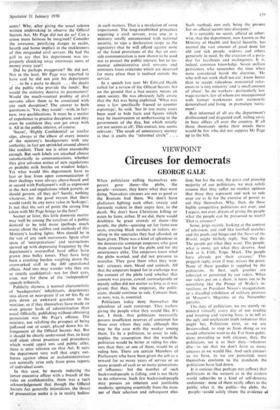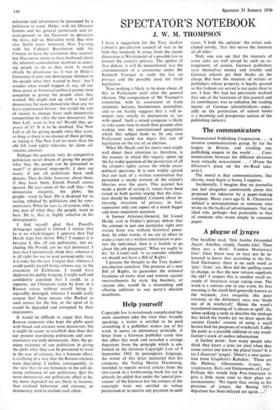VIEWPOINT
Circuses for democrats
GEORGE GALE
When politicians calling themselves em- perors gave them—the plebs, the people—circuses, they knew what they were doing. Nowadays circuses are not as good as the Romans had them. We don't have gladiators fighting each other, sweaty and furiously violent intheir angry fear, to the death. We don't have Christians killing or eaten by lions, either. If we did, there would doubtless be great crowds of them—the people, the plebs—queuing up for front-row seats, creating black markets in tickets, ex- ulting in the spectacles they had aflorded, or been given. There was a kind of splendour in the democratic contempt emperors who gave them circuses had for the plebs and for the entertainers alike. The emperors knew what the plebs wanted, and did not presume to moralise. They gave them what they wan- ted: circuses, men, blood and animals. All that the emperors hoped for in exchange was the consent of the plebs (and whether that consent was joyous, cowed, curmudgeonly or merely sullen did not matter so long.as it was given) that they, the emperors, the politi- cians, should continue to rule. Consent then, as now, was, is, essential.
Politicians today deny themselves the splendour of such contempt. They eschew giving the people what they would like. It's not, I think, that politicians necessarily possess insufficient reserves of contempt for those over whom they rule, although this may be the case with the weaker among them. To be a politician, to essay to rule, implies the assumption that the would-be politician would be better at ruling his elec- tors than they, or one of them, would be at ruling him. There are certain Members of Parliament who have been given the job as a reward for so many years of service or so many pounds of cash or so many generations of influence: but the number of such backwoodspeople is falling, and is not likely to do otherwise. Such few backwoodspeople may possess an inherent and justifiable modesty. springing essentially from the man- ner of their selection and subsequent elec- tion; but for the rest, the great and growing majority of our politicians, we may safely assume that they suffer no modest opinion that those they represent and seek to rule over are as fit for the exercise of power as are they themselves. Why, then, do these highly competitive politicians not ever, and I repeat, not ever, dream of giving the people what the people can be presumed to want? That is, circuses?
Some, prigs mainly, looking at the content of television, and stuff like football matches and the pools and bingo and the News of the World, might blithely reply, but they do. The people get what they want. The people. what is more, get what they deserve. And look at it. Filth. Tripe. Muck. The people have already got their circuses.' This priggish reply, even if true, misses the point. None of these goodies is supplied by the politicians. At best, such goodies are tolerated or permitted by our rulers. When our rulers put on a show, it turns out to be something like the Prince of Wales's in- vestiture, or President Nixon's inauguration, or a dreadful exhibition of military prowess in Moscow's Maytime or the November parades.
The duty of politicians, we are sternly re- minded virtually every day of our reading and listening and viewing lives, is to tell us the ugly and unpleasant truth (whatever that might be). Politicians exist, so we are brainwashed, to stop us from doing as we would otherwise want to do. Far from politi- cians providing us with circuses, they, the politicians, see it as their duty—whatever else—to see that we don't have as many circuses as we would like. And such circuses as we have, as we are permitted, must themselves conform to the standards the politicians have laid down.
It is curious (but perhaps not yellow) that politicians in the western as in the eastern world subscribe to a kind of self-denying ordinance: none of them really offers to the public what it, the public—the plebs, the people—could safely (from the evidence of salesmen and advertisers) be presumed by a politician to want. Hitler, with his Olympic Games and his general permission and en- couragement to the Germans to persecute the Jews, did so. Mussolini tried. But who else. Stalin never bothered. Mao Tse-tung with his Cultural Revolution' told the Chinese to have the revolution they wanted; but Mao never seems to have bothered about the inherent contradiction involved in order- ing people to do as they want. It would clearly be disastrous (as it was in Hitler's Germany) if only one demagogue shrieked to the people what they wanted to hear: but I wonder what would happen if, say, all our three great or historical political parties here competed in giving the people what they wanted. We might end up with a kind of democracy far more democratic than any we have experienced before : but would the sort of society to emerge from such democratic competition be what the new democrats, the New Left, want to live in? Would they ap- prove of it? It is to be doubted. The New Left is all for giving people what they want, so long as there is no chance of them getting, or taking it. The New Left no more than the old left (and right) tolerates, let alone ad- vocates, circuses.
Perhaps the question 'why do competitive politicians never dream of giving the people what they the people can be presumed to want?' is phrased improperly. I dare say many, if not all, politicians have such dreams. They do little, however, about them, if they have them. Enoch Powell comes nearest. He says some of the stuff they—the democratic majority, the plebs, the people—want to hear. He is despised for so saying, rebuked by politicians and by com- mentators. What he says is, of course, only a tiny part of what they, the people, want to hear. He is, that is, highly selective in his demagoguery.
I find myself glad that Powell's demagogic appeal is limited. I rejoice that he is no whole-hogger. I approve that Ted Heath slaps him down. Why? I suspect it is because I, like all our politicians, not ex- cluding Mr Powell, am no real democrat. I fear that I instinctively think that, whereas it is all right for me to read pornography, say, it is risky for the rest. I regret that, whereas I could justify myself being witness, say, to the execution of Eichmann, I would have deplored his public hanging. I might well and confidently conclude that I could, as a reporter, see Christians eaten by lions in a Roman circus without myself being ir- reparably damaged, whereas I would easily assume that those masses who flocked to such arenas for the fun, or the sport of it, would be degraded and corrupted by their enjoyments.
It would be difficult to argue that those Roman emperors who kept the plebs quiet with bread and circuses were democrats; but it might be easier to establish that than that our present moralising politicians and com- mentators are truly democratic. Also, the ge- nuine reticence of our politicians in giving the plebs what they can be presumed to want in the way of circuses, has a humane effect, is civilising in a way that the Roman circuses were degrading. I incline, consequently, to the view that we are fortunate in the self-de- nying ordinance of our politicians; tkat the more democratic our politicians affect to be, the more degraded we are likely to become; that civilised behaviour and circuses, or democracy, tend to exclude each other.



































 Previous page
Previous page